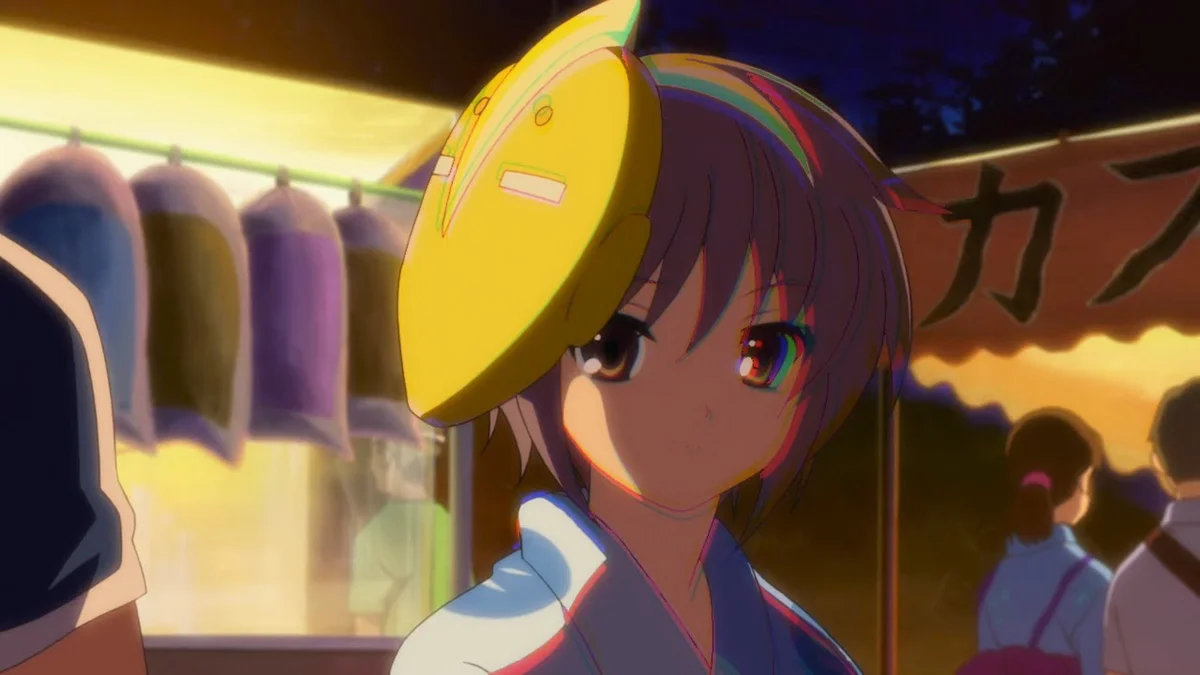The warm air of a Japanese summer under her nose, boredom in her socks, young Haruhi, as usual, forces her group to go out — outdoor activities, crowded pools, festivals, fireworks… anything is good to fill her days. But what Haruhi doesn’t know is that in trying to escape boredom at all costs, she has trapped her friends, and herself, in an endless time loop.
The Endless Eight arc from The Melancholy of Haruhi Suzumiya remains one of the most polarizing stories in anime. Its repetitive structure frustrates and challenges the audience, but beneath this surface lies a rich psychological exploration of two opposing experiences: Yuki Nagato’s passive suffering from awareness and Haruhi Suzumiya’s restless boredom rooted in ignorance. Through carefully constructed visuals and subtle shifts in each episode, Kyoto Animation (KyoAni) immerses us in the psychological burdens these characters carry.
Yuki’s Suffering: Stasis and Repetition

Yuki Nagato is the sole character who remembers each of the 15,532 iterations of the time loop. Her internal world is shaped by this unending awareness, leading to a state of passive suffering. She bears the weight of this knowledge in silence, a psychological burden KyoAni captures through visual stillness and repetition.
Static Positioning and Visual Stasis
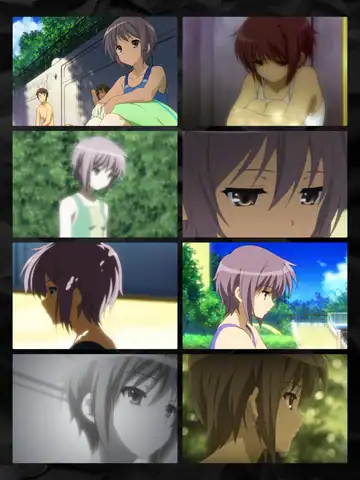
Yuki is often shown sitting quietly in the background, detached from the group’s summer activities. Her posture and positioning remain static across episodes, emphasizing her resignation to the loop’s futility. The subtle shifts in her position serve to remind the viewer of her awareness of every minor change, without giving her the power to act. She is fully aware of the loop’s futility but lacks the agency to change it, mirroring the psychological state of someone trapped by knowledge without the ability to act.
Muted Color Palettes Reflect Emotional Erosion
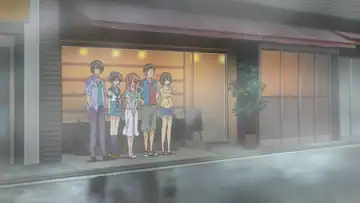
As the episodes progress, the colors become increasingly dull and muted, particularly in scenes involving Yuki. The vibrant summer tones that once filled the screen slowly degrade, mirroring Yuki’s emotional exhaustion. This visual deterioration mirrors the erosion of her inner world as she continues to experience the same events over and over again. By the time the audience notices this shift, they too begin to feel the same weariness as Yuki.
Haruhi’s Boredom: Restless Energy Without Understanding
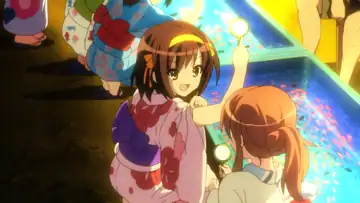
In contrast to Yuki’s quiet suffering, Haruhi Suzumiya embodies a different psychological struggle: the frustration of boredom. Haruhi’s restless energy drives her to constantly seek new experiences, but her ignorance of the time loop leaves her trapped in a cycle of repetitive activities. KyoAni captures this psychological tension through Haruhi’s unrelenting energy and the brisk pace of the group’s summer outings.
Dynamic Visual Representation of Haruhi’s Energy
Haruhi’s constant motion is visually represented through sharp camera movements and quick cuts, reflecting her endless pursuit of novelty. Yet her energy is a trap in itself — she remains blind to the loop’s repetition, repeating the same activities without realizing it. Her inability to perceive the loop traps her in a cycle of unsatisfied desires. This dynamic energy contrasts sharply with Yuki’s stillness, further highlighting the characters’ respective psychological states.
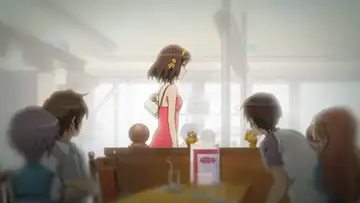
Day and Night Cycles: Restlessness vs. Suffering
KyoAni uses the day-night cycle to reinforce the psychological contrast between Haruhi and Yuki. The bright, active daytime scenes reflect Haruhi’s pursuit of excitement, while the quiet, darker nighttime settings emphasize Yuki’s silent suffering. As Haruhi seeks stimulation during the day, the night signals the return of the psychological weight Yuki carries. These alternating visual cues highlight the dual experiences of the two characters.
Subtle Variations: A Metaphor for Psychological Traps
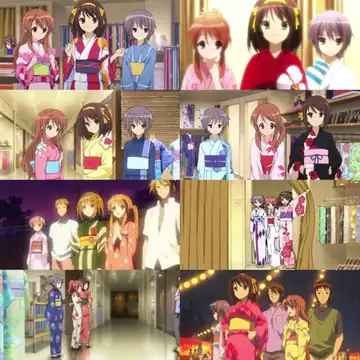
The minor differences between each episode serve as a metaphor for the characters’ psychological entrapment. While Haruhi continues to engage in the same activities without noticing the loop, Yuki is painfully aware of every slight variation. These small shifts — a change in dialogue, a different outfit, or a new activity — reflect the futility of Yuki’s awareness and Haruhi’s ignorance.
Minor Details Highlight the Futility
Yuki notices every small change, but these details offer no comfort. Each variation represents a moment of fleeting difference, but they ultimately reinforce the same outcome. This gap in awareness drives both characters’ suffering — Yuki’s knowing despair and Haruhi’s unfulfilled restlessness.

Repetition as a Psychological Metaphor
The repeated visuals and activities become a powerful metaphor for Yuki’s imprisonment in awareness and Haruhi’s trap of ignorance. The audience too is drawn into this repetition, sharing the characters’ frustration. The endless repetition becomes a psychological prison for Yuki and a cycle of ignorance for Haruhi, echoing broader human experiences of stasis and unfulfilled pursuit.
Setting the Stage for The Disappearance of Haruhi Suzumiya
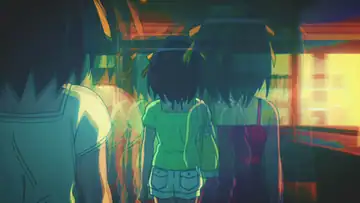
The Endless Eight arc not only serves as a narrative experiment but also sets the psychological groundwork for The Disappearance of Haruhi Suzumiya. The relentless loop primes the audience to understand Yuki’s emotional and mental breaking point, setting the stage for her eventual decision to alter reality in Disappearance.
Visual and Psychological Release in Disappearance
The shift from the endless summer of Endless Eight to the serene winter of The Disappearance of Haruhi Suzumiya marks a visual and emotional release for Yuki and the audience. The oppressive, repetitive activities of summer give way to a calm, quiet world, symbolizing Yuki’s escape from the loop. After enduring countless repetitions, Yuki’s decision to break free feels both inevitable and emotionally cathartic.

Conclusion: A Psychoanalytical Exploration of Suffering and Boredom
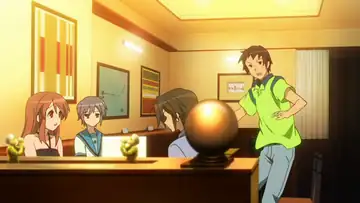
Endless Eight is a psychoanalytical study of two characters trapped in contrasting psychological struggles. Yuki, burdened by her knowledge of the loop, suffers silently, while Haruhi, driven by an insatiable need for excitement, remains oblivious to the cycle that holds her. KyoAni’s subtle visual cues and the repetitive structure of the arc immerse the audience in their respective struggles, drawing us into Yuki’s resignation and Haruhi’s restless pursuit of novelty.
This buildup prepares us for the emotional release in The Disappearance of Haruhi Suzumiya, where Yuki finally takes control of her fate. In this way, Endless Eight serves as a deep psychological study of suffering and boredom, reflecting the challenges of human consciousness through its unique narrative experience.
